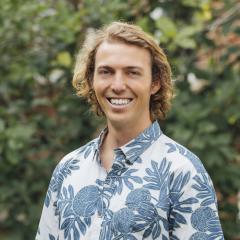About Nākoa's Work
Nākoa Farrant (he/him) is a Kanaka ‘Ōiwi (Native Hawaiian) Ph.D. candidate at the Bren School of Environmental Science and Management at UC Santa Barbara. His graduate research investigates the opportunities for former sugarcane plantation fields in Hawaiʻi to be managed to meet local sustainability goals. He leverages remote sensing and GIS data to explore optimal land allocation strategies to meet goals for local food production, biodiversity conservation, carbon sequestration, and cultural perpetuation. Recognizing that community stakeholders, particularly Native Hawaiians, often lack influence in land use decisions, he also interviews individuals engaged with food systems in Hawaiʻi to incorporate their perspective on how former sugarcane land could be managed to meet the needs of the community. He aims for his work to inform policies that incentivize responsible use of the limited land resources in Hawaiʻi.
Since high school, Nākoa has been determined to address Hawaiʻi’s food insecurity and perpetuate Hawaiian knowledge to restore a state of ʻāina momona (abundance). He has been involved with several restoration projects in biocultural food systems in Hawaiʻi. While pursuing his B.S. in Environmental Science and Engineering at Harvard University, he modeled the food production potential of alternative land uses in an Indigenous integrated agriculture and aquaculture system in Heʻeia, Hawaiʻi to assist with restoration efforts. Throughout his career, Nākoa will continue to integrate conventional and Kanaka ‘Ōiwi knowledge systems to inform ecologically sensible and culturally relevant management of resources in Hawaiʻi.
